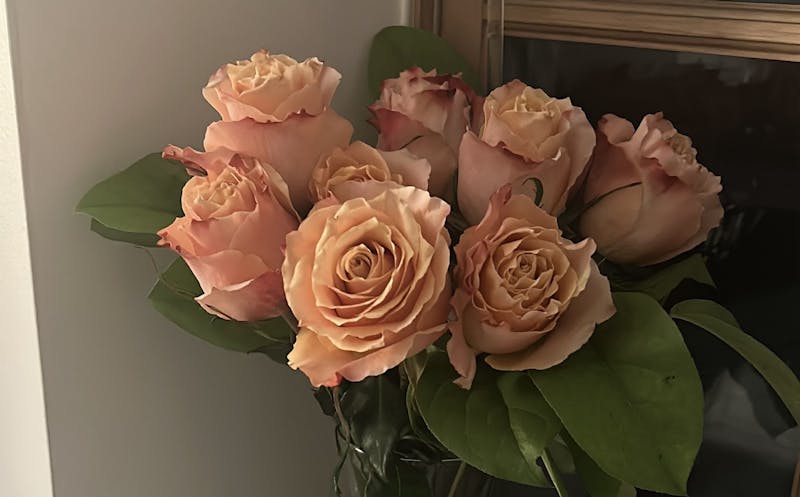
COURTESY OF MYRA SAEED
My September roses, when they’re easy to love and admire.

COURTESY OF MYRA SAEED
My September roses, when they’re easy to love and admire.
I want to theorize that no one actually likes flowers. People swoon over the lovable stage: a beautiful bouquet bloom — a proud, delicate beauty perched in front of them, pleasing their senses. To them, a bursting bouquet represents specialty, as if to say, yes, you deserve the beauty that surrounds you now. I am one of millions of girls who swoon over any pink rose bunch delivered to my door, carefully wrapped in a brown paper casing and a matching pink tinted ribbon. But truth be told, flowers require consistent attention to remain in their embellished state. Whether they’re on their bush or already cut, they are temporary by nature. Their beauty exists in an intermediate stage, suspended briefly between life and death. People love flowers when they’re blooming; few love them when they start to fade.
I say I love flowers. How could I say otherwise? They’re beautiful. I’d feel foolish rejecting something so universally adored. I love receiving them. I love putting them on display. I admit — flowers make me feel beautiful too, as if, by association, I’m blooming with the same certification for enamoration.
As with all things I love for the wrong reasons, my flowers turn on me faster than I’m prepared for. The once-blushing pink roses I stuck in a vase back in September now lean sadly against each other, their rotting stems and wilting petals protruding toward my face every time I glance at the window. Their stems have softened, curling under their own weight. I haven’t thrown them out.
As I pass by and catch the vibrant colors draining into dullness, I wonder if their fates may have been spared had I changed their water — or maybe invested in a flower food packet. Maybe I should have pressed them when I had the chance, to preserve a beauty that never lasted long enough to imprint inside me. It would take less than five minutes to throw them away, rinse the vase, start over. But I don’t. I let them linger.
Caring for flowers feels beyond me these days. Maybe I’m a typical college teenager (yes, I choose to call my 19-year-old self a teenager in fear of the word adult) who simply struggles with classes, love and the like — who is too tired at the end of the day to throw out her damned dead flowers. Maybe I’m a person struggling to feel at peace with a fractured world, oscillating between trying to understand a discipline I don’t know if I want to study or crying through headlines about families torn apart by war or wondering where I went wrong with those friends who I no longer speak to. I feel it internally, almost physically — like something inside me is just as rotten as those petals staring back at me. Disillusionment piles at the base of my vase, and the world keeps reminding me of everything I can’t control: wars I can’t stop, systems I can’t improve, people I can’t reach. My vase fills with cloudy water until it bursts through my eyes, night after night.
In those moments, I don’t entirely know what I want. Do I want to save the world? Save myself? Am I simply searching for proof that I matter? I used to view this deepening sadness and unsettlement as consequences of my intrinsic rottenness — feeling that my personal decay and negative attributes are the only things I can control. I always felt that the ideal version of myself should be the beautiful bouquet I dreamed of, with petals reflecting someone who acts, who contributes, who matters. Someone whose vase is always full of fresh blooms, meticulously trimmed and watered.
But perhaps those long minutes spent staring at the wilting petals have quietly rewritten the way I understand the anxiety beneath my sleepless nights. I used to approach my “negative qualities” like a malfunction to fix. Now, that notion almost feels self-centered to me; the lens that once convinced me that my ability to contribute to the world only remains if I’m perfect wilts away the longer I view my vase. I simply feel like I’m a witness to my surroundings, to my community. Just like every human, my rot is inevitable — struggling through change, questioning my interests, feeling helpless in issues bigger than me. There is a quiet tenderness in choosing to pay attention to my vase of dying flowers and choosing to hold it close before letting go and starting fresh.
I am not expected to change the world, nor to obtain the perfect scores or write the perfect article. Each iteration of myself, informed by my own blooming and withering, teaches me more about the world and my place in it. I still dream that my big bouquet can always come, but I’ve learned to make peace with the cycles of alive and dead, alive and dead.
I like to audaciously claim that I love flowers, especially when they’re wilting, hunched over and begging for my love in my clouded vase.
Myra Saeed is a sophomore majoring in Chemistry and History from Great Neck, N.Y. She is a News and Features Editor for The News-Letter.